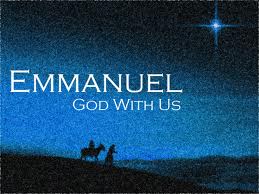
-22-12-2019-
4th Sunday of Advent -Year A
Gospel Text: Matthew 1:18-24
 vs.18 This is how Jesus Christ came to be born.
vs.18 This is how Jesus Christ came to be born.
His mother Mary was betrothed to Joseph; but before they came to live together she was found to be with child through the Holy Spirit.
vs.19 Her husband Joseph, being a man of honour and wanting to spare her publicity, decided to divorce her informally.
vs.20 He had made up his mind to do this when the angel of the Lord appeared to him in a dream and said,
“Joseph son of David, do not be afraid to take Mary home as your wife, because she has conceived what is in her by the Holy Spirit.
vs.21 She will give birth to a son and you must name him Jesus, because he is the one who is to save his people from their sins.”
vs.22 Now all this took place to fulfil the words spoken by the Lord through the prophet:
vs.23 “The virgin will conceive and give birth to a son and they will call him Immanuel,” a name which means “God-is-with-us”.
vs.24 When Joseph woke up he did what the angel of the Lord had told him to do: he took his wife to his home.
************************************************
We have four sets of homily notes to choose from.
Please scroll down the page to read them.
Michel DeVerteuil : A Holy Ghost Priest, fmr. Director of the Centre of Biblical renewal , Trinidad, W.I.
Thomas O’Loughlin: Professor of Historical Theology, University of Nottingham.
John Littleton: Director of the Priory Institute Distant Learning, Tallaght, Dublin 24
Donal Neary SJ: Editor of The Sacred Heart Messenger
*******************************************************
Michel de Verteuil
Lectio Divina with the Sunday Gospels – Year A
www.columba.ie
General Comments
The story of the virginal conception of Jesus is historical but is also deeply symbolic, and your meditation will reveal to you that this is how Jesus Christ always comes to be born into the world, in all the various ways in which this happens.
You can read it as a story of Joseph, symbolic of those whose vocation it is to welcome the one who bears God within her. You might like to stay with the long and painful journey which this vocation involves, identifying with Joseph’s fears, his hesitations and eventually his total commitment. You might prefer to concentrate on his vocation to name the child.
 It is also the story of Mary; although she does not say a word right through. She is the symbol of those who bear God within them and must wait until their collaborators welcome them and so allow God’s work to be born. Do not, however, invent your own story of how Mary felt or what went through her mind; take the text exactly as you find it and you will find ample material to help you understand the work of God.
It is also the story of Mary; although she does not say a word right through. She is the symbol of those who bear God within them and must wait until their collaborators welcome them and so allow God’s work to be born. Do not, however, invent your own story of how Mary felt or what went through her mind; take the text exactly as you find it and you will find ample material to help you understand the work of God.
The fulfilling of prophecy is an important part of the passage and you might like to meditate on it as expressed in verses 22 and 23. It would help if you read the original passage in Isaiah; as you will see there, the prophecy is a response to the king of Judah who looked for security in alliances with the powerful nations around him. Like all of us, he did not recognise ‘how Jesus Christ come to be born’.
Scriptural Prayers
Lord, any commitment involves a long journey.
We remember when we first committed ourselves:
– we would fight against racism or sexism or injustice at the workplace;
– we decided to give up drink and work among addicts;
– we accepted public office;
– we began giving spiritual direction.
At first we felt very happy,
then one day we recognised that this was your work,
in which success could not be measured in earthly terms.
It was like when Joseph discovered that Mary, his betrothed,
was with child through the Holy Spirit,
and we too decided to extricate ourselves as discreetly as we could.

But first, as we had made up our minds to do this,
you sent an angel to us, someone who told us not to be afraid
just because we now knew that we were involved in a work of the Holy Spirit.
We thank you that when we thought about it
we found the courage to do what your angel told us to do.
Yes, this is always how Jesus comes to be born.
“There is some spouse within us that we must meet and, failing that, we fail wholeness. There is in the heart of us all some image of the Beloved which we must not merely acknowledge but know, love and embrace. Without this marriage there can be no real human life.”
…Matthew Kelty, Cistercian monk
Lord, Mary is that noble part of ourselves,
bearing your Son Jesus who was conceived by the power of the Holy Spirit
– our generosity, the ability to sacrifice ourselves, to give all to a cause.
That part of ourselves frightens us; we would prefer to deny it is there at all,
to remain with our mediocrity and our compromises.
Send us your angel to reassure us that we must not be afraid to take that Mary to ourselves, so that through us your Son Jesus may be born into the world.
“We do not have to put God into the world. He is there. But we must preserve his presence and aid our brothers and sisters to find him.” … A worker priest
Lord, as Christians we act as if we are doing the world a favour by our service.
But the world is like Mary bearing divinity in her womb,
and you want us, like Joseph, to welcome her with reverence
because of this presence within her.
We must proclaim to all that within the world we can find Emmanuel,
a name which means God-is-with-us.
 Lord, people always think that the way to renew a society is by enlisting the support of the powerful.
Lord, people always think that the way to renew a society is by enlisting the support of the powerful.
Today we can see clearly that once again you are creating a new kind of civilisation through small communities, composed mainly of poor people,
fulfilling the word that you have often spoken through the prophets,
that no great power but a humble maiden will conceive
and give birth to a new beginning for society
and the world will know that you are with us.
Lord, we think today of women who are pregnant and are not being accepted.
Send your angel in the shape of supporters to those families,
reminding them that they must not be afraid to welcome this pregnancy
because it is your gift to them.
Lord, it sometimes happens that we have a project within us,
one that you conceived in us through your Holy Spirit.
Others, even those who love us deeply,
cannot understand what is happening to us.
They fuss and worry, give us up and then come back to us.
Teach us to wait like Mary, knowing that when the time comes,
they will take us to their hearts and this project will come to birth.
Lord, there was a time when we were afraid to come near to Jesus,
thinking that we were not good enough.
But you sent us Joseph, who named Jesus for us,
as one who saves us from our sins.
**************************************
3. Thomas O’Loughlin,
Liturgical Resources for Advent and Christmas
www.columba.ie
Introduction to the Celebration
 We are beginning the celebration of God coming to us, God being with us, we being brought into the presence of God. This is the great mystery of Christmas: it is the feast of Emmanuel which means ‘God is with us.’ This is our special celebration this Sunday, but each time we gather here we remember the words of Jesus: ‘When two or three are gathered here in my name, I am there among them’. So, let us spend time reminding ourselves that Jesus is among us, we are in his presence in this gathering, and recalling that we are the people who proclaim him as Emmanuel: God is with us.
We are beginning the celebration of God coming to us, God being with us, we being brought into the presence of God. This is the great mystery of Christmas: it is the feast of Emmanuel which means ‘God is with us.’ This is our special celebration this Sunday, but each time we gather here we remember the words of Jesus: ‘When two or three are gathered here in my name, I am there among them’. So, let us spend time reminding ourselves that Jesus is among us, we are in his presence in this gathering, and recalling that we are the people who proclaim him as Emmanuel: God is with us.
Homily notes
1. The name ‘Immanuel’ or ‘Emmanuel’ (the spelling differences are related to Hebrew and Greek forms respectively) is only found on two occasions in the books the first Christians looked upon as ‘The Scriptures’: in Is 7:14 and 8:8 where it is a name that can be applied to Ahaz’s son and to the whole people and which is interpreted in Is 8:10 as ‘God is with us.’ Matthew, in using it at the beginning of his gospel (and he is the only evangelist who uses the term or quotes Is 7:14), and explicitly explaining its meaning, is forming a frame to his entire gospel whose final words are: ‘I am with you always, to the close of the age.’ So we can see his gospel within the boundaries set by 1:23 and 28:20 – it is the story of the presence of God with his people. Now this perspective on the Christ-event is a theme at the very heart of Advent/ Christmas. From this perspective, to accept the gospel is to believe that God is with us.
2. But what does it mean to believe that ‘God is with us’? That we actually believe this – as distinct from giving it verbal recognition – we should not take for granted. Our world tends to push ‘God’ out to the frontiers of our ways of thinking and imagining life and the universe. From the way most people use the word’ god’ it is clear that they are thinking of a distant, impersonal force. For other people – those who dabble in the New Age Movement – the word’ god’ often signifies a projection of our needs for an unknown other that can be trifled with but is not seen as a person who has made himself known through revelation. There are many who call themselves Christians who think of ‘God’ as far from them, but also think that ‘it’s good to have a religious dimension’ to their lives: ‘God’ is just a code word standing for’ all noble human desires’. All these fall very far short of the living person who lives within the Good News, and which is what gives life in every generation to its message.
 Then, for Christians, there are the objects, systems, and beliefs that are seen as more present, more pressing, and more ‘real’ than God: money, power, and sex are still the great headings under which we can range the various forms of idolatry where a created object is put in the place of the creator. And, on that note it is worth pointing out that there is a special form of idolatry to which clergy are prone: imagining the reality of the divine as less important than the panoply of religion – an idolatry that manifests itself when people are more sensitive to the forms and regulation of the structures than to the gentle breath of God or the demands of justice, mercy, and doing what is right.
Then, for Christians, there are the objects, systems, and beliefs that are seen as more present, more pressing, and more ‘real’ than God: money, power, and sex are still the great headings under which we can range the various forms of idolatry where a created object is put in the place of the creator. And, on that note it is worth pointing out that there is a special form of idolatry to which clergy are prone: imagining the reality of the divine as less important than the panoply of religion – an idolatry that manifests itself when people are more sensitive to the forms and regulation of the structures than to the gentle breath of God or the demands of justice, mercy, and doing what is right.
3. To live our lives in the light of ‘God is with us’ is the vocation of each Christian, but it is also the vocation of a lifetime.
4. How can the whole topic of believing’ God is with us’ then be brought before us in a homily? One the one hand, the whole liturgy of Advent and Christmas is an attempt to bring this mystery before us; but on the other hand, one can hear the words but this is not some simple piece of information to be learned; it is something that we have to grasp with our minds, our emotions, and our wills. One way is to lead a meditation on a series of questions.
5. Do we believe we encounter the presence of God in our gathering? Jesus said: ‘For where two or three are gathered in my name, there am I in the midst of them’ (Mt 18:20).
Do we believe we encounter the presence of God in combating hunger and human want? Jesus said: ‘for I was hungry and you gave me food, I was thirsty and you gave me drink, I was a stranger and you welcomed me’ (Mt 25:35).
Do we believe we encounter the presence of God in combating poverty and injustice? Jesus said: ‘I was naked and you clothed me, I was sick and you visited me, I was in prison and you came to me’ (Mt 25:36).
 Do we believe we encounter the presence of God in love, in goodness, in creativity?
Do we believe we encounter the presence of God in love, in goodness, in creativity?
We believe that God is the source of our light and goodness. As Jesus said: ‘Let your light so shine before all, that they may see your good works and give glory to your Father who is in heaven’ (Mt 5:16).
Do we believe that we can encounter the presence of God in prayer, and become aware that God is personal and hears us? Jesus said:
‘And whatever you ask in prayer, you will receive, if you have faith’ (Mt 21:22).
6. In each case I have taken the quotation from a single gospel Matthew – to show how this concern with believing in the presence of God, God being with us, runs right through his gospel; but the same point could be illustrated from any number of places. It is a basic conviction of Christians that God is known and close and seeks to encounter us.
7. Over the next few days we will hear ‘Emmanuel’ in the liturgy in its prayers and hymns and carols. We may hear this gospel passage read several times. Each time we hear the name ‘Emmanuel’ we have to remind ourselves that we are challenged to believe that ‘God is with us.’ It is the Christian conviction about this that inspires the whole celebration of Christmas.
***********************************
John Litteton
Journeying through the Year of Matthew
www.Columba.ie
Reflection
Joseph is someone about whom we know little. There are few references to him in the gospels apart from the stories about the birth, infancy and childhood of Jesus (see Mt 13:55 and the parallels in Mark and Luke). He is very much a secondary or background figure in the gospel story. Yet, he is a real Advent person because, in a truly humble and remarkable manner, he prepares for the arrival of the Messiah into his life and into the world.
Matthew presents Joseph as having had no part in Mary’s pregnancy. When Joseph discovered that Mary was pregnant he wondered how this could be since they had not been living together as husband and wife. Initially he was confused and he did not know what to do. However, he did not act rashly. He listened to God’s word through the angel’s message in a dream and, although it demanded much faith, he did what God asked him. He allowed his life to be influenced and directed by God’s will. Therefore, without complaining, Joseph decided to prepare for the birth of Jesus by caring about Mary during her pregnancy.
Thus two aspects of Joseph’s character are revealed to us. Firstly, Joseph was obviously a man of deep faith. He trusted God and, discerning God’s will, took the great leap of faith into the unknown in a difficult and confusing situation. God moved him in strange ways and he was responsive to this. Secondly, Joseph was selfless. He did not alienate Mary but, instead, accepted her and remained loyal. His selflessness enabled him to act without fear of ridicule and scorn. Doing God’s will was all-important for Joseph.
We can learn from these two aspects of Joseph’s character. For example, how do we respond to God who often communicates with us in strange ways? Are we able to make the leap of faith when we are unsure about the future? Can we acknowledge and embrace those people and life situations which least suit us? Advent is about cultivating our ability to focus beyond our own concerns and respond to the needs of other people so that Christ can come into our lives through them.
Joseph, in the portrait painted of him in Matthew’s Gospel, prepared for the birth of Jesus with gentleness and faithfulness. He cherished and supported Mary and, together, they brought Christ into the world. Joseph’s discernment of God’s will empowered his confidence. We are challenged to imitate Joseph’s example as we live and work with other people.
 Joseph was a man of few words but decisive and significant actions. His behaviour made a difference. Unfortunately, some of us speak many words but these words are rendered meaningless by our contradictory behaviour. This can easily occur during the days of Christmas when we gather as families and friends. Therefore, let us learn from the example of Joseph. Let us discern and accept joyfully God’s will in our lives. And let us pray to Joseph, asking him to help us to do God’s will always.
Joseph was a man of few words but decisive and significant actions. His behaviour made a difference. Unfortunately, some of us speak many words but these words are rendered meaningless by our contradictory behaviour. This can easily occur during the days of Christmas when we gather as families and friends. Therefore, let us learn from the example of Joseph. Let us discern and accept joyfully God’s will in our lives. And let us pray to Joseph, asking him to help us to do God’s will always.
For meditation
When Joseph woke up
he did what the angel of the Lord had told him to do.
(Mt 1:24)
*****************************************
Donal Neary SJ
Gospel Reflections for Sundays of Year A: Matthew
www.messenger.ie/bookshop/
The Call to Joseph
 In religious terms we would call Joseph a faithful type of guy, observant in religious thought and practice. The visit from the angel tests his faithfulness to God and to Mary. He doesn’t let them down. He was called to be the carer of Jesus and Mary and to find a new openness to the mystery of God.
In religious terms we would call Joseph a faithful type of guy, observant in religious thought and practice. The visit from the angel tests his faithfulness to God and to Mary. He doesn’t let them down. He was called to be the carer of Jesus and Mary and to find a new openness to the mystery of God.
A temptation of religion is to tie things down too much. The law in Joseph’s time was strict – if a woman was pregnant the man would cancel the betrothal, and she might be stoned to death! Joseph went beyond law to love and the mystery of God’s call. Good religion is open to the mystery of life, however life challenges us and calls us.
Some of the most open-minded people I have met have been very religious, and some of the most narrow-minded people have also been religious! Like good and bad medicine, there is good and bad in religion.
True religion is open to mystery. We need a church lit with the light of God, as Joseph was. His burden was lifted when he was open to God, to take Mary home as his wife, no matter what others might think
This is the annunciation to Joseph – the word of God from the angel to Joseph in a dream. It opened him to a huge new meaning in life. We accept this word as a central part of our lives, and the next time we meet the word, it will be made flesh.
Picture your houseand all who live in it.
Imagine the light of Christ in each room and on all.
Lord, you are the word of God, who is made flesh,
have mercy on us.
*****************************************